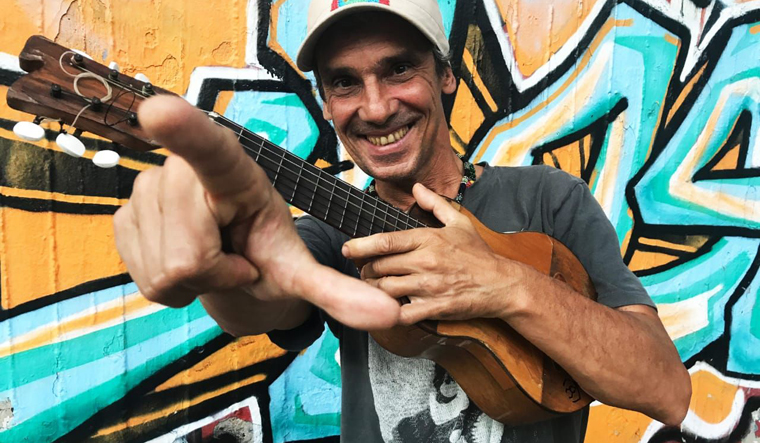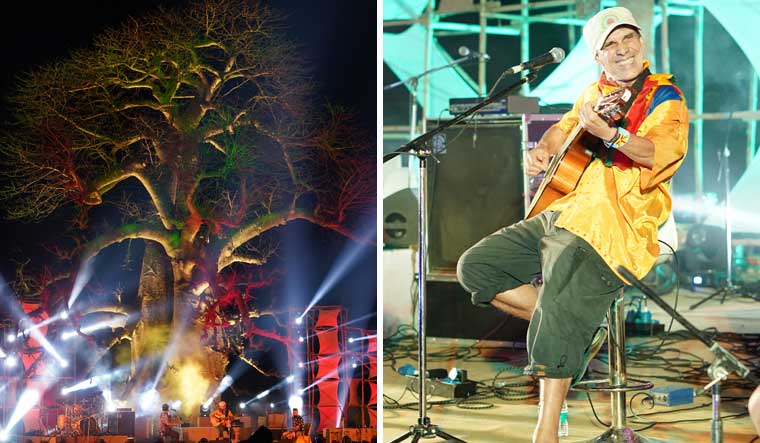What could be the ideal stage for a musician who can sing in more than nine languages and is a bonafide citizen of the world? A Pied Piper who marches to his own tunes and who can get crowds to ecstatically breeze and bounce to songs of “Bloody Bloody Border”, immigrants, ghettos and revolution? An itinerant soul whose genius feeds on bringing people together to sing under the moon and the stars, and in the wind and rain?
When Franco-Spanish singer-songwriter Manu Chao recently performed against the backdrop of a magical, mysterious baobab tree in the temple town of Orchha in Madhya Pradesh, the symbolism of the moment was not lost on someone who knows the archaeo-botanic history of the ancient tree. Baobabs are some of the world’s largest and oldest trees, but more importantly, they are gifts from a different culture. They point towards oceanic trade and migration pathways between India and Africa. It was the African traders and slaves who brought these majestic trees to India, and less than 15 are left in the country. So when 58-year-old Chao punctuated his best-known songs in Orchha with chants of “No one is illegal”—in a town where “Ram Raja” is given a gun-salute every night as deserving of a just king who treats everyone with fairness—one could not but wonder how an individual becomes the message.
“Why, there can be something like azadi trance,” says an excited Chao on the sidelines of Namaste Orchha, an initiative by Madhya Pradesh Tourism Board. Chao was the headliner in the music section of the inaugural cultural festival conceived by documentary filmmaker and politician Yasmin Kidwai. On the lawns overlooking a brilliantly lit Jehangir Mahal in the Orchha fort complex, he sports his regulation cap, a sporty T-shirt and shorts, and is with his coterie of musicians and travelling companions a day before his show. The vagabond musician speaks of his journey across India, and his onward journey to Bangladesh, Sri Lanka, the Philippines and Laos. There are no coronavirus fears in the air. And there is one word that he keeps repeating in his conversation: azadi (freedom).
He talks about the anti-CAA protests he visited in Kolkata, how he sang with rappers in pubs, open streets and the ghats. “There is this one guy we met there and he is a f***ing star. He is a genius,” he says, struggling to recall the name of the musician. “We are definitely going to work with him,” says Chao, who is known to collaborate with musicians on the go. His set list for Namaste Orchha was also improvised in transit with a local musician in a bus.
The man has been wedded to people and their stories in a career spanning four decades. Chao began by busking in the streets of Paris before he started commanding electrified crowds of hundreds of thousands from Europe to Latin America. In the world of reggae, punk and Latin alternative, the name of Manu Chao always yields a spirited approval. It is also a name you learn to tout after Bob Marley when you talk about cool musicians concerned with social justice. His political ballads born out of conflict and suffering sound as upbeat and groovy as declarations of love and, as one of his songs go, "tequila, sexo y marihuana" (tequila, sex and marijuana).
It is no coincidence that his first solo album in 1998 that catapulted him to stardom was called Clandestino, which translates to "illegal immigrant". Chao's parents were political refugees from Spain who fled Francisco Franco's dictatorship to the suburbs of Paris. His communist grandparents were exiled to Algeria and Cuba. Chao is also believed to be close to far-left political groups like the Zapatistas. His Galician journalist father greatly shaped his artistic temperament. In the green room, Chao will happily regale you with stories of the intellectuals of the day who visited his father's home. "[Gabriel Garcia] Márquez was a friend of my father," he says before adding, "But he wasn't very famous then." But ask him anything about himself, and he will raise his hands in resignation: "Sorry, I don't have anything to say about my work."
It is this constant zooming out to the world around him, to be able to tap into some common cause with a crowd hitherto unfamiliar with his music that explains the electric exuberance of his concerts. “We will seek out more interesting acts like Manu,” says the band Indian Ocean’s guitarist Amit Kilam, who curated the music programme for Namaste Orchha. “It is not just pop or rock.... Once you are transported to this different world, where you just listen and get one with the artist, it will set some part of your mind racing. It will sow some seed of transformation.”
The day after the festival, when the world was busy checking for updates on the coronavirus and cancelled flights, Chao sends a WhatsApp message: “Here (in) Bangladesh. Very interesting!”



